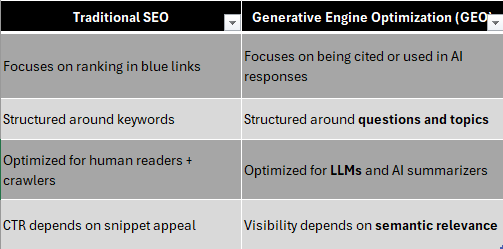Generative Engine Optimization (GEO) is the practice of optimizing your content specifically for AI-powered search engines like Google’s Search Generative Experience (SGE), Bing Chat, or ChatGPT’s web browsing mode.
Unlike traditional SEO, which aims to rank your page on Search Engine Results Pages (SERPs), GEO focuses on helping your content get featured or cited directly in AI-generated answers. GEO aims to improve relevance, accuracy, creativity, and engagement in AI-generated results.
Why GEO Matters Now
With the rise of generative AI in search, users are:
- Getting summarized answers at the top of search results.
- Often not clicking through to websites.
- Expecting quick, conversational responses based on reliable sources.
If your content isn’t optimized for these AI summaries, you risk losing visibility and traffic even if your SEO is strong.
How GEO Differs from Traditional SEO

Key Aspects of GEO:
- Prompt Engineering – Crafting precise, structured, and well-defined prompts to guide AI toward the best possible output.
- Keyword Optimization – Using the right words and phrases to ensure AI understands context and intent.
- Data Training & Fine-tuning – Optimizing datasets and training inputs to improve AI-generated outputs.
- Context Management – Providing detailed context to maintain coherence in generated text or images.
- AI Bias Reduction – Structuring inputs to avoid biases and ensure fair, balanced results.
- Performance Analytics – Tracking AI output quality and refining inputs for better results over time.
GEO is becoming increasingly important as businesses, marketers, and content creators rely on AI to generate blog posts, ad copy, product descriptions, images, and even code efficiently.
How to Measure GEO Success
Although GEO metrics are still evolving, watch for:
- Increased citations in AI answers (SGE, Bing Copilot, etc.)
- More branded queries and awareness
- Lower organic CTR but higher impression share
- AI-generated traffic in tools like GA4 (though it’s limited)